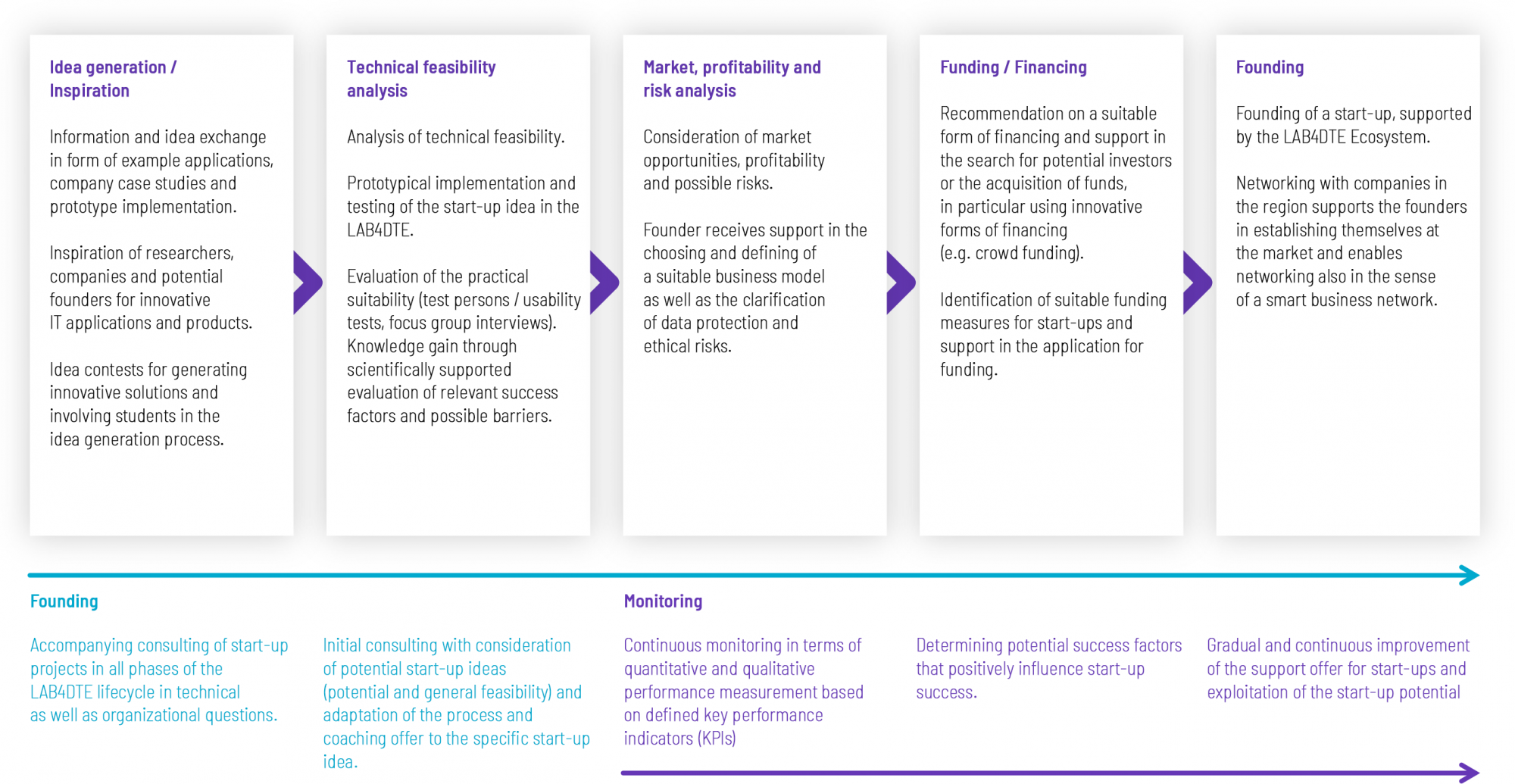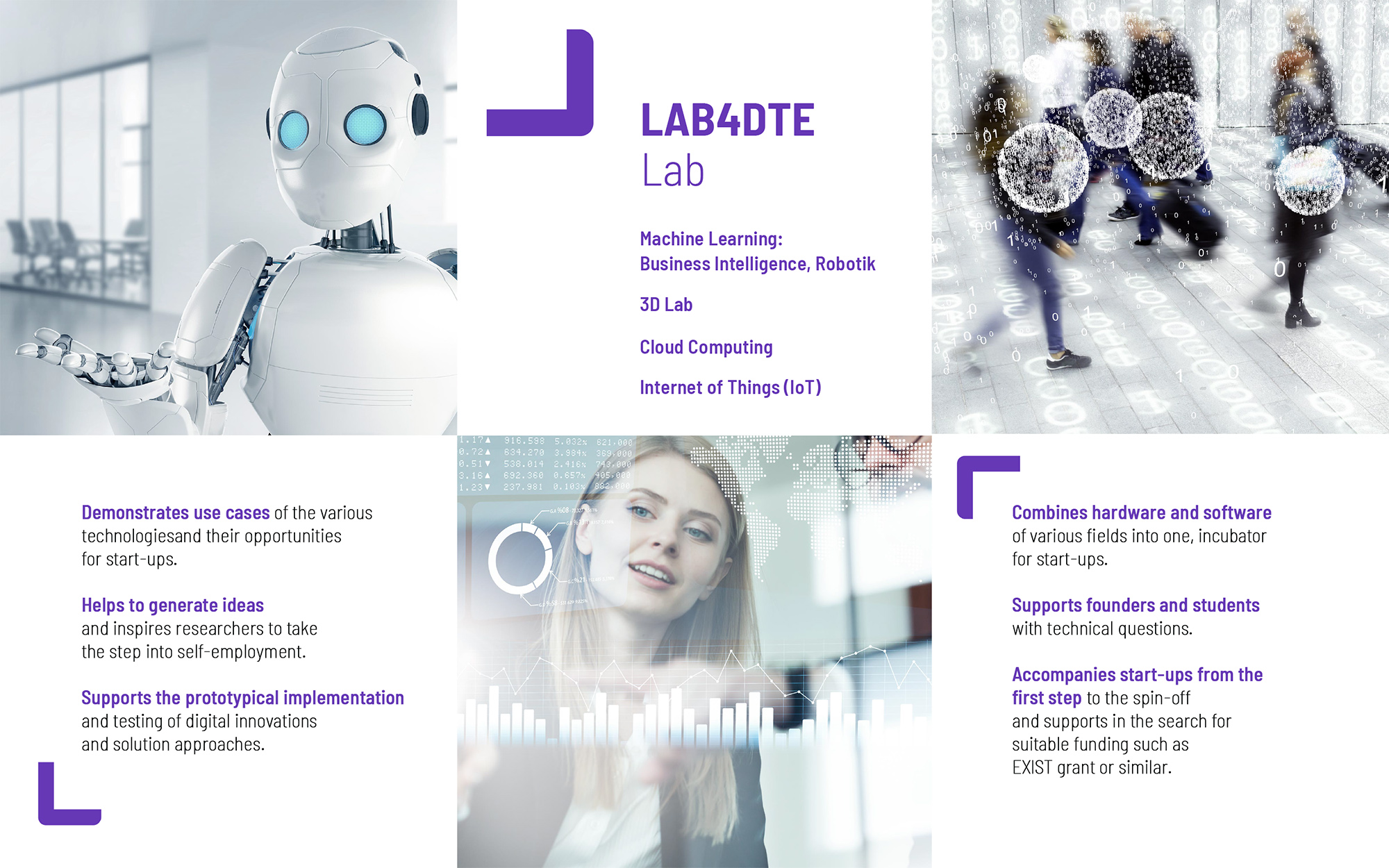Offer for Founders
The LAB4DTE supports entrepreneurs in all phases of a founding process, from idea generation and identification, feasibility analysis and prototypical implementation, to the final founding with accompanying start-up consulting and monitoring of the founding success. The primary goal of the LAB4DTE is not to filter good start-up ideas, but rather to improve the quantity and quality of start-ups at RWU and to better exploit the existing start-up potential.
LAB4DTE Lifecycle
1. Generation of ideas/ Inspiration (Idea contests)
As a testing and demonstration laboratory, the LAB4DTE brings together scientists, potential founders, entrepreneurs and investors and enables the exchange of ideas and know-how in different areas of digitalization. Sample applications, company case studies, and prototype implementations support the exchange of information and ideas as well as inspire researchers, companies, and those interested in starting up to create innovative IT applications and products. The organization of specific idea contests encourages the generation of new approaches to solutions, involves students in this process in an optimal way and offers companies a platform for developing new types of solutions to problems.
2. Technical Feasibility Analysis
Depending on the nature of the start-up idea and the necessary technical means for its implementation, a suitable analysis of technical feasibility is conducted in this phase. If technically and organizationally possible, a prototypical implementation and testing of the start-up idea takes place in LAB4DTE. Depending on the type and readiness of the prototypical implementation, a suitable evaluation of the practicality takes place afterwards, e.g. in the form of a subject or usability test or a focus group interview. A scientifically supported evaluation ensures a continuous gain of knowledge about relevant success factors and possible barriers.
3. Market, Profitability and Risk Analysis
Once the technical feasibility and practicality of the start-up idea have been ensured, the final step in the analysis is to consider the market opportunities, profitability and possible risks. Classic business models cannot be transferred 1:1 to digital solutions and products. In this phase, the founder therefore receives targeted support in selecting and defining a suitable business model. The risk analysis also deals in particular with data protection and ethical risks, which are important in the context of the digital transformation.
4. Financing/ Funding
Based on the results of the previous phases, a suitable form of financing is recommended and support is provided in the search for potential investors and the acquisition of funds, especially through innovative forms of financing (e.g. crowd funding). An important focus in the context of fundraising is the identification of suitable funding measures for start-ups and support in applying for funding (e.g. the EXIST start-up grant).
5. Founding
In this phase, the concrete founding of the company takes place, supported by the IBH transfer ecosystem. Networking with companies in the region supports the company founders in establishing themselves on the market and enables networking in the sense of a smart business network.

ACCOMPANYING ACTIVITIES
COACHING ALONG THE LAB4DTE LIFECYCLE
Start-up projects are offered accompanying consulting in all phases of the LAB4DTE lifecycle, both in technical and organizational issues, e.g. in areas such as financing, law or corporate management. During an initial consultation, potential start-up ideas and innovations, their potential and general feasibility are taken into consideration and further process steps are designed in the sense of adapting the process to the specific start-up idea and identifying suitable coaching offers for the founder (e.g. individual consultations or seminars on specific topics).
Besides the initial consultation, the coaching offer also includes consultations in special areas of expertise. For example, interested parties can receive advice on the topics of idea development, innovation management, company founding and financing. Important legal topics such as tax law, competition law, commercial law, trademark and patent law, data protection and information security are also covered.
In order to increase the founders' chance of success, the topics of business management, employee management, marketing and sales are offered in particular.
Consultancy and training in the areas of networking, communication and behavioral training should also help to ensure the success of the founders in the long term.
PROFESSIONAL / TECHNOLOGICAL MENTORING
With its 30 active professors, the Institute for Digital Transformation (IDW) at RWU covers all relevant areas and topics of digitalization. The members of the respective departments support the setup and operation of the LAB4DTE testing and demonstration lab. The provided know-how and student assistants as well as student projects support the implementation of demonstrators and case studies. The potential founders are supported all the way from idea generation, technical implementation and consideration of technical feasibility to the market, profitability and risk analysis in the sense of professional/technological mentoring. In all phases of the LAB4DTE lifecycle, IDW ensures that the ideas, concepts, and solution approaches are in line with the technological state of the art as well as with ethical issues and aspects of data protection and data security.
MONITORING (ACCOMPANYING RESEARCH)
Based on defined key performance indicators (KPIs) for all phases of the LAB4DTE lifecycle, continuous monitoring is performed in terms of quantitative and qualitative performance measurement. As part of accompanying scientific research, potential success factors that could positively influence the success of the start-up or the defined KPIs are identified. The collection of quantitative information, e.g. number of ideas considered, number of prototypical implementations, number of start-ups, etc., as well as qualitative information, e.g. reasons for the rejection of an idea, the abandonment of a start-up, etc., and the evaluation of start-up ideas through focus group interviews or subject and acceptance tests based on prototypically implemented approaches, serve as input for an analysis of the most important factors for successful and unsuccessful start-ups or the abandonment of the start-up idea in a specific phase of the LAB4DTE lifecycle. Such a monitoring along the entire LAB4DTE lifecycle enables a continuous improvement of the offer for start-ups and the exploitation of the start-up potential. In addition, the accompanying research provides generalizable knowledge about the suitability of the methods used to promote start-ups in the university environment.
Guides for founders
Here are a few guides with useful tips to help you with your start-up.
Innovation Lab
The LAB4DTE innovation lab supports the prototypical implementation and testing of digital innovations and solutions in the areas of Business Intelligence & Machine Learning, Internet of Things & Mobile Services, 3D Sensors, Cloud Computing & Distributed Architectures, as well as Automation & Robotics. The basic approach is to provide suitable hardware and software frameworks that allow prototypical implementation and demonstration of innovative solutions and product ideas. For this purpose, the LAB4DTE builds on already existing hardware and software equipment of the RWU and extends and supplements it in order to achieve the greatest possible degree of flexibility and coverage of different solution approaches and techniques.
